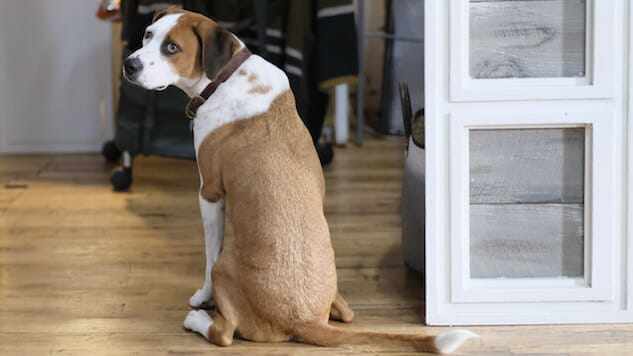The Radical Earnestness of Downward Dog
Photo: ABC
Martin has the voice of your college dorm’s friendliest stoner: Sonorous but not serious, his most grandiose pronouncements slowed by the fact that his mind and his tongue are moving at different speeds. He shows concern over your lack of “self care” and relishes the freedom of the ill-considered act; he is kind and caring, if at times a bit daft, no less lost than you are but still hopeful that understanding is around the next corner. That Martin (voiced by series co-creator Samm Hodges) is a dog might scare one away from the brief, beloved Downward Dog, canceled by ABC before the conclusion of its first season, though this is, in fact, its secret weapon, the phone booth Superman slips into to slough off Clark Kent. Martin’s presence, and the series’ sweet, silly premise, is delightful cover for its heroic undercarriage, squaring space for its foremost risk: At the heart of Downward Dog is its radical earnestness, the belief that to be and to feel fully is almost always to court embarrassment—and that the real shame is to relent to the pressure to hide one’s emotions, rather than staring them in the face.
On the surface, then, Downward Dog seems unremarkable. It follows Martin’s owner, Nan (the quietly magnificent Allison Tolman), as she navigates the end of her relationship with Jason (Lucas Neff) and tiptoes around her fragile boss (Barry Rothbart), pausing on the traditional subjects of the network sitcom: Nan tries dating again (the guy’s a dick); spends a day with her best friend, Jenn (Kirby Howell-Baptiste), in search of lost youth (the twentysomething bar is truly horrible); sleeps with Jason in a moment of soused weakness (it’s a mistake). With each stumble, Martin comments on Nan’s choices—so strange to him, so familiar to us—painting people as their canine companions might see them, flailing, baffling, patchy-haired animals, untrained pups for the whole of their lives.
It’s this mirror effect, quirky but convincing, that both forms the season’s structuring conceit—the ad campaign Nan launches for the hip retailer where she works—and shapes its sincere complexion, rearranging our expectations in slyly effective ways. Dialogue that might otherwise read as saccharine (“Maybe love is the greatest protection there is”) becomes, through the combination of Hodges’ lackadaisical speech and Martin’s innocent expression, a kind of childlike wisdom: Dogs Say the Darndest Things. This isn’t to say that Downward Dog isn’t funny; it is, often wildly, adolescently so, particularly when Martin’s attention turns to his own foibles—I’m still laughing at his description of a cat’s feces as “butt candies.” But the narration, which in lesser hands might slip into shtick, is the motor of the series’ poignant sentiment. It deflects the ironic inflection of the modern sitcom onto a dog, and so opens Nan’s arc to an ocean of feeling that other series might mine for sorrow, or simply ignore.